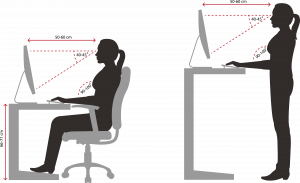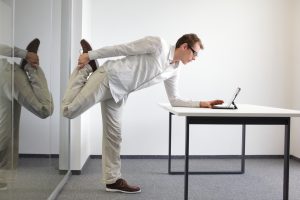
Healthy office habits have been a hot topic for decades, as has virtual work; does this change when we can no longer go into the office?
As a “office worker”, and subsequently having had the pleasurable experience of two herniated discs, I have been the recipient of extensive medical advice from every type of practitioner you can think of.
I have spent the better part of three weeks working from home compliments of Coronavirus social distancing. I am tired, my eyes hurt, and I am worried how my physiotherapist will treat my back pain from two metres away. Of course, I know what I should be doing, I just do not seem to get around to doing it. I recently wrote about looking after your team, but what about you? Let me share what I know that I am not doing:
1. Healthy Posture
The first time I went to my physio, she took five minutes then asked, “you work in computers, right?”
Our bodies evolved over millennia into a bi-pedal form. The skeleton has not yet adapted to eight to twenty hours a day in a chair in front of a monitor with sharp right angles all over. Our natural position is upright. As I learned through an acutely painful stint of sciatica bought on by my back collapsing, our body is a miraculously connected system, with bones, muscles and nerves all working in chorus to support our being.
A computer user, especially a laptop jock, bends all the curves in their spine the wrong way. When this happens, the muscles which hold us upright must adjust to weird angles they are not designed to do, as do the neural connections. We are trying to turn a tree into a creeper, and things will snap.
Correct posture

This is the advice from my physio:
- Sit in a chair which holds your thighs parallel to the ground, your lower legs at right-angles to this, and your feet flat on the ground.
- Do not use the chair as support as far as possible. For example, try not to lean against the back of the chair, and sit forward so your legs are not resting on the seat. This not only keeps your core exercised to support itself (kind of), but also helps reduce the risk of other conditions like varicose veins and DVT.
- Your back should be upright, and, as in my case, you may need lumbar support.
- Your head should be upright and angled back from the screen. Support your head with your own strength, not a headrest. I was given an orthopaedic chair which has a horrible neck support widget. It is dreadful, but on reading the manual (we do this right) I found that this was intentional for the reasons above.
- Face the screen directly, not from an angle. Computers placed conveniently at the corner of the desk, so they aren’t in the way of the paperwork encourage you to bend your neck sideways too often. Place your computer in front of you.
- The monitor should be in line with your eyes. Your eyes should be horizontally in line with the upper-middle of the monitor.
- Your arms should be parallel to the ground, and try keep your elbows and wrists from scrunching in. Keep your shoulder- and arm-span open, like you’re hugging the keyboard. This also opens your lungs so you can breathe better.
Simon says…
Some people prefer standing desks. The health benefit of these is still not clear. I feel that your body will tell you what is right. You get desks which allow you to change between sitting and standing but they are expensive. Experiment first. Laptops are, by their very nature, mobile, which is great because you could go and work under a tree for a bit and come back and stand in the kitchen.
2. Maintain a healthy diet
Stay hydrated
Water. Often. Enough said. Keep a bottle with you. Don’t drink from the toilet.
I was relieved to discover there seem to be advantages to moderate coffee consumption. But working at home means it is easy to fill-up more regularly. After a week I started getting headaches and feeling grotty in the afternoons. Excessive caffeine use causes dehydration, and potential kidney damage. Limit it and watch the sugar.
Eat smart
A cholesterol scare a few years ago forced me to change my diet radically. The office day starts with a choco-free breakfast, and packed nuts, carrots, and a whole-wheat salad roll for work. The water fountain is a wonderful place to meet people, while staying refreshed and hydrated.
All these good habits flew out the window when I moved into my home study. The day starts at 5am with coffee over the keyboard, more coffee, and the next thing you’re being told it’s pm!
Take regular breaks to eat healthy food or snacks. It is not only good for you from a dietary perspective, it also forces you to have breaks.
3. Exercise

The thing about an office is that when you are there, you are exercising all the time by getting up, walking to meetings, or down the corridor to the water-cooler.
At home, there is nowhere to go. The kitchen is ten metres from the study, which means the Fitbit is clocking about thirty steps a day.
In South Africa, gyms are closing because of COVID-19, and with the army stationed in town, I certainly am not getting on my bicycle any time soon.
Fortunately, I have a garden. A run around the perimeter fence with the dogs is a start. A considerable proportion of our population do not have this luxury. We need to find ways of keeping our regimes under lock-down.
Don’t forget to work your core muscles. Skip around the house, bounce on the bed, whatever floats-your-boat.
4. Manage your Time
The office is full of distractions, but at home, if you are isolated, you can be in a state of flow all day and not realise it. Getting to flow is great for productivity, but unhealthy in excess. Break your day up by creating real interruptions with alarms, and make a physical change during these gaps. Stand up, walk around the house, do your exercises, have some water.
You’re no good dead
We are in a crisis, and many of us are working long hours to keep our businesses operating. You are going to start seeing the cracks in your team after a few weeks. You might want to pick up work for others to protect them, but you not doing anyone favours by burning yourself out. You will just add give them additional work while you are out of commission. Work reasonable hours. This crisis is a marathon, and you are going to have to pace yourself.
Online meetings in moderation
Meetings are boring! After a day of online meetings, I feel like I have been through a full rinse cycle. Sure, you can play Call of Duty on the side to get through online meeting (although Zoom will narc on you) but that is not the solution.
During #funtimes we must keep our people socially engaged. Regular dialogue is good, but don’t make them sit through daily two-hour sessions. Be quick, be smart, be gone.
6. Maintain a Healthy Environment
Lighting
You can find many articles on how to light your room so you come across best on camera. What is most healthy for you is natural lighting. You are a living creature, and the natural system is (viruses aside) what we evolved to work best with. Vitamin D is rather good for fighting off disease and the sun is one of the primary sources.
Keep lighting at daylight levels. Fortunately, LED manufacturers are now developing globes which are not so harsh. I certainly struggled with the old blue-white burn; they make me look like I have something far worse than COVID-19 when on camera.
Position your light sources so they do not cause glare, either directly into your eyes, or off reflective surfaces. Also watch the shadows. A light in the wrong place might cast a shadow halfway across your screen and trying to focus across the contrast could affect you over an extended period.
Ventilation
Our brains need oxygen to work. Right now, our outside air is the freshest it has been for years. If you do not have access to a door or window, make sure your ventilation works for you. Office fights over air-conditioners are one of my favourite blood-sports. You can now avoid all of that!
7. Equipment
We are limited by our wallets or what our employers can give us. At home, the challenge for decent equipment is emphasised by our own budgets.
A decent setup might consist of:
- A good desk with space on it to work with a computer and anything else.
- A healthy, ergonomic chair supporting a good working posture. If you are the standing type, a standing post is a lovely addition.
- A monitor which is clear and does not require you to lean forward and squint at the writing.
- A reasonablys-ized keyboard so you are not scrunching your elbows and wrists at weird angles.
- A mouse which does not drive you mad by losing the cursor all the time.
- A decent webcam and microphone. People on the other side do not need the experience of hearing you from a steel bathtub.
- If you are in noisy surroundings, or in a home where other people need their space, headphones will go a long way to respect your online peers.
- Lastly, you need broadband because video conferencing takes its toll on your data.
8. Develop Healthy Habits
Stay Social
We are by nature social creatures. The Coronavirus crisis has forced us out of this mode into an isolated one. Stay in touch with your colleagues regularly.
Check-ins are great, but this is not big-brother situation. Rather, we want to let people know they are still connected, and under stress conditions, that they have support.
Watch the multi-tasking

I have a cool three-screen setup at home, and I often have Outlook, Zoom, Teams and WhatsApp up all at once. At this moment, I.T. is everyone’s best friend and I feel like the switchboard alien from Men in Black.
Recent studies seem to show that multi-tasking is not healthy. Excessive unfocused work can damage your learning and recall capabilities, and not just over the short term.
Try and to stick to one thing at a time:
- Only open one app at a time and see the task through to completion.
- Silence your phone.
- Share your diary and ask people to respect it.
- Delegate work rather than doing it for people.
And in healthy conclusion…
Remember that what our bodies do naturally is probably the healthiest thing to do.
How are you experiencing the new way of work?
